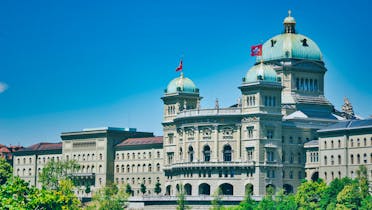
«Talent wins games, but teamwork and intelligence win championships.» These wise words from Michael Jordan referred to the sport that made him world famous: basketball. A basketball player like Jordan can be tall, tactically smart, nimble and fast – but without team play with other good players, these attributes are not enough to win a championship.
At first glance, basketball has little to do with Swissgrid. But when it comes to the continental European electricity system, Jordan’s quote applies just as much as in sport. Thanks to good teamwork with European partners, grid security can be guaranteed in Switzerland and its neighbouring countries. Ensuring this in the long term is like being European champions year after year. Just like basketball players, each country has its strengths and weaknesses. But they all have the same goal. That is equally true this year and especially in the coming winter: everyone wants to win the championship together.
Thanks to good teamwork with European partners, grid security can be guaranteed in Switzerland and its neighbouring countries.
Switzerland – a player with different rules of play
As part of the continental European interconnected grid, Switzerland also has its strengths and weaknesses. Domestic hydropower accounts for around 60 percent of the Swiss electricity mix and can be made good use of in the team. In summer, so much electricity is generated with water in Switzerland that it can be exported to neighbouring countries. What is more, the reservoirs in the Alps represent important energy stores for Europe. But hydropower production fluctuates due to seasonal variations in water levels. Switzerland is dependent on electricity imports from abroad during the cold season. This is when it can take advantage of the strengths of other countries.
There is only one problem that makes team play in the European interconnected grid difficult. Due to the lack of an electricity agreement, Switzerland is unable to play by the same rules as EU countries. This has consequences. With 41 cross-border lines, Switzerland is strongly integrated into the continental European interconnected grid. This means that it cannot simply be sent to the bench. It remains in the game, but is increasingly excluded from important official bodies and platforms. In other words, it is left out of the strategic briefings and the resulting moves. Firstly, this has a negative impact on grid operations. And secondly, it gives rise to disadvantages for Swiss energy producers and traders. In order for Switzerland to be able to import electricity from the surrounding countries in winter, there must be sufficient capacity available at Switzerland’s borders for imports. However, due to the increasing exclusion of Switzerland and the lack of an electricity agreement, these import capacities are not guaranteed and will even decline between now and 2025.
Due to the lack of an electricity agreement, Switzerland is unable to play by the same rules as EU countries. This has consequences.
The EU has introduced a new rule of play in the form of the provision referred to as the 70% rule. This states that from 1 January 2020 (with a transition period until the end of 2025), EU member states must make at least 70% of the capacity of their grid elements available for trade between EU member states. Or, to stay true to the basketball allegory: 70% of the passes must be exchanged between EU players. However, if our neighbouring countries have difficulties in meeting this 70%, there is a risk that they will unilaterally limit cross-border capacities with Switzerland in order to satisfy the rule for trade within the EU. This could massively curtail Switzerland’s import capacities, and Switzerland would find itself very isolated on the pitch.
The situation is not sustainable for Switzerland, as a good team player. Swissgrid is therefore endeavouring to bring Switzerland back in as an active player. It is negotiating private-law agreements with EU transmission system operators so that Switzerland can be included in the coordinated processes with these operators. This would improve grid security and Switzerland’s ability to import, but only in the short term. The agreements are subject to approval by all participating EU regulators and must be renewed every year. Consequently, the problems that arise for Swissgrid due to the lack of an electricity agreement are not solved in the long term.
Playing alone neither brings victory, nor makes sense
The good thing about a team is that you can support each other. Countries also support and help each other in the continental European interconnected grid. If, for example, a power plant fails in Switzerland, «assistance» in the form of automatically activated control energy flows over the cross-border lines from neighbouring countries into Switzerland and helps to stabilise the system frequency.
If Switzerland were to play alone and not as a team, the entire reserve for a power plant failure in Switzerland would have to be available within Switzerland itself. It would have to be possible to compensate outages of big power plants at any time. Depending on the season, that means that 10 to 20 percent of power would be lost. As a result, the frequency would drop dramatically and cause a grid disturbance. This would lead to a partial to complete power system failure. The game would definitely be lost – and the chances of winning the championship ruined.
From a technical point of view as well, it is not possible for Switzerland to operate as an island. Synchronous condenser technology would, in principle, be suitable for controlling or limiting the electrical load flow. In order to use this technology, phase-shifting transformers would have to be installed on all cross-border lines, which would be a very expensive and lengthy process. The new equipment would cost up to 1 billion Swiss francs. On account of coordination, procurement and installation deadlines, it would take 15 to 20 years before the phase-shifting transformers could be used. But even with this additional equipment, electricity flows could not be completely blocked. All the effort involved would therefore not lead to more grid stability.
Let’s stay on the ball and in the game
Switzerland has been part of the continental European interconnected grid since 1958. That was when the grids of Switzerland, France and Germany were interconnected for the first time at extra-high-voltage level. This was because in the post-war period, it was already clear to all those involved that grid security and security of supply would improve thanks to interaction with the other countries. That has not changed in the last 80 years. Integration into the European electricity system remains an important prerequisite for guaranteeing a secure, economical and environmentally compatible electricity supply for Switzerland. It is therefore essential that Switzerland stays on the ball in European policy. In order to remain in the game and achieve a level playing field, a joint, constructive and sustainable solution with the EU is needed.





